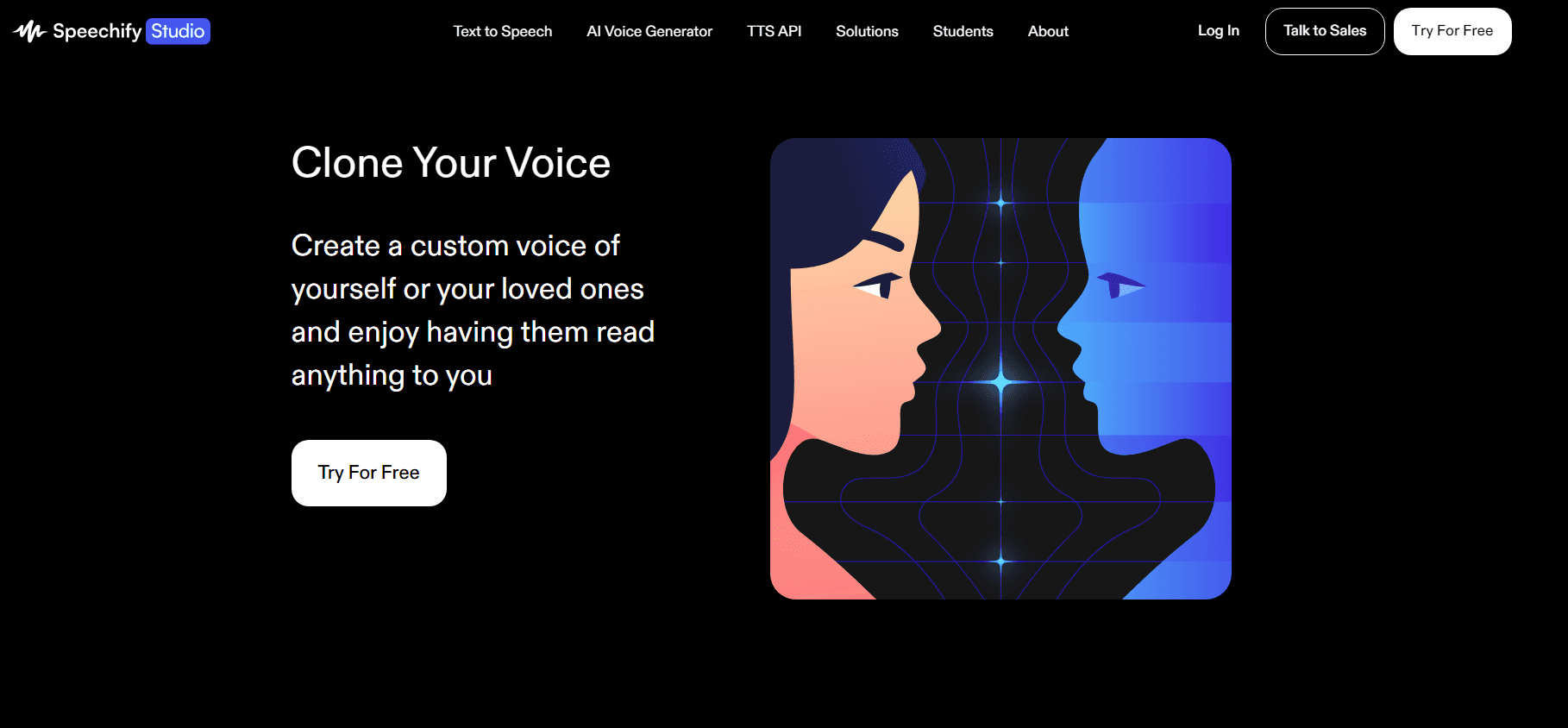Clone your voice with Speechify! Upload clear samples, let AI analyze them, and get a natural-sounding voice clone. Start cloning now!

Akshat Mandloi
Updated on
December 26, 2025 at 11:36 AM
Your voice is one of your most personal things—it carries your tone, emotion, and identity. But what if you could replicate your voice using AI? Imagine having a digital version of your voice that could read scripts, narrate audiobooks, or generate lifelike voiceovers without requiring you to record each time.
This technology is not just for voice actors or big media companies. AI voice cloning is becoming more accessible than ever, allowing content creators, businesses, and individuals to produce high-quality, custom voiceovers with minimal effort. Whether you're looking to preserve a voice, automate content creation, or experiment with AI-generated speech, voice cloning opens a world of possibilities.
One of the most popular platforms for AI voice cloning is Speechify. Known for its text-to-speech technology, Speechify also offers a voice cloning feature that enables users to create a digital version of their voice.
But how exactly does Speechify’s voice cloning technology work? What are the steps involved in cloning your voice using AI? In this post, we'll guide you through the step-by-step process of cloning your voice with Speechify, and explain how AI voice cloning works.
What is AI Voice Cloning?
AI voice cloning is a technology that uses artificial intelligence to create a digital replica of a person’s voice. By analyzing the unique characteristics of your voice—such as tone, pitch, cadence, and pronunciation—AI can generate realistic synthetic speech that sounds just like you.
Voice cloning is possible thanks to deep learning and machine learning algorithms, which train on voice recordings to mimic speech patterns with high accuracy and natural expression. This technology has a wide range of applications, from creating lifelike voiceovers to enhancing accessibility for individuals with speech impairments.
How AI Voice Cloning Works?
AI voice cloning follows a structured process that ensures your cloned voice sounds as natural and accurate as possible. Here’s how it works:
Collecting voice samples: AI models need a dataset of clear, high-quality voice recordings to learn from. The more samples available, the better the cloned voice will sound.
Training the AI model: The AI model learns from the voice data, refining its ability to generate new speech that closely resembles the original voice.
Generating synthetic speech: Once trained, the model can produce lifelike speech from text input. Users can then type any text and hear it spoken in the cloned voice.
AI voice cloning has transformed how voiceovers and speech synthesis processes, helping individuals and businesses create high-quality audio more efficiently.
Cloning Your Voice Using AI with Speechify Step-by-Step

Speechify is a popular AI-powered text-to-speech tool that offers voice cloning capabilities for content creators, businesses, and individuals who want to generate realistic speech from their own voice.
Cloning your voice with Speechify is straightforward, requiring only a few recordings and some AI processing to generate a lifelike digital version of a voice. Below, we'll walk through each step to help you create and use a cloned voice with Speechify.
1. Preparing Voice Samples
Before cloning your voice with AI, you need high-quality voice samples to ensure accurate replication. Follow these steps to prepare high-quality voice samples for Speechify’s AI voice cloning:
Use a high-quality microphone: A clear and crisp recording ensures the AI captures every detail of your voice. Avoid using built-in laptop microphones, as they can introduce background noise.
Record in a quiet environment: Background noise, echoes, or disturbances can interfere with the AI’s ability to analyze your voice accurately. Choose a soundproof or quiet space to record.
Speak naturally and consistently: Use a clear, steady tone without exaggerating pronunciation. Speak at a normal pace, avoiding rushed or overly slow speech.
Provide multiple voice samples: AI voice cloning improves when trained with varied recordings. Read different types of content—short sentences, long paragraphs, and conversational speech—to help the AI understand your natural speaking style.
Ensure proper file format and quality: Speechify may require specific audio formats (e.g., WAV, MP3) and a minimum bitrate for quality assurance. Check the platform’s guidelines before recording.
2. Uploading Voice Samples to Speechify
Once you have high-quality voice recordings, the next step is to upload them to Speechify's voice cloning platform. This process allows Speechify's AI to analyze your recordings and generate a digital replica of your voice.
Follow these steps to upload your voice samples:
Log in to Speechify: Access your Speechify account through the web platform or mobile app.
Navigate to the voice cloning section: Look for the option labeled "AI Voice Cloning" or "Create a Custom Voice."
Upload your recordings: Select and upload the prepared voice samples. Ensure that they meet Speechify's file format and quality requirements.
Confirm audio processing: Speechify will analyze your voice samples using AI models that detect tone, pitch, and speech patterns. This may take a few minutes.
3. Generating the Cloned Voice
After uploading your voice samples, Speechify's AI processes the recordings to create a digital replica of your voice. This step involves deep learning algorithms analyzing the unique characteristics of your speech, including tone, pitch, and cadence.
Here’s what happens during this stage:
AI voice modeling begins: Speechify's system processes the uploaded audio to identify speech patterns and vocal traits.
Machine learning refines the voice: The AI refines the voice by mimicking how you speak, ensuring the cloned voice sounds natural and authentic.
The first version of the cloned voice is generated: After a short processing time, Speechify will produce an initial version of your AI-generated voice.
Preview the cloned voice: You can listen to a sample to check how closely it matches your authentic voice.
Proceed to fine-tuning: If the voice needs adjustments, Speechify allows you to tweak different settings before finalizing the clone.
4. Fine-Tuning and Customization
Once Speechify generates your cloned voice, you can fine-tune and customize it to make it sound more natural and expressive. This step is crucial because the AI-generated voice might need adjustments to match your original speaking style better.
Here’s how you can refine your cloned voice:
Adjust pitch and tone: Modify the pitch to make the voice sound deeper or higher, ensuring it closely resembles your natural speech.
Control speaking speed: Speed up or slow down the voice to match your natural rhythm. A well-paced voice enhances clarity and engagement.
Test different settings: Play with various configurations and listen to previews until you achieve the most realistic result.
5. Using the Cloned Voice
Once your cloned voice is ready, you can use it across different applications. Here's how you can use your cloned voice effectively:
Create audiobooks, podcasts, or voiceovers without recording every sentence manually.
Use the voice for accessibility features, allowing people with disabilities to listen to text in a familiar voice.
Generate multilingual speech if the platform supports additional languages.
With Speechify's AI voice cloning, you can streamline content production, save time, and ensure consistency across all your audio projects.
Pricing and Accessibility
Speechify offers different pricing plans to cater to various needs, from casual users to professionals who require advanced AI voice cloning and text-to-speech features. Here's a breakdown of its pricing and accessibility options:
Speechify Text-to-Speech Plans:
Limited ($0/month): Includes 10 standard voices, 1x reading speed, and basic text-to-speech functionality.
Premium ($29/month): Unlocks 200+ high-quality voices, 60+ languages, support for scanning and listening to printed text, 5x speed reading, and advanced skipping & importing options.
Speechify Audiobooks Plan:
Audiobooks ($9.99/month): Grants access to 60,000+ audiobooks, including new releases and best-sellers, with 12 credits per year to purchase premium titles.
Speechify API:
Speechify offers an AI voice API for developers looking to integrate text-to-speech functionality into apps and services. However, it is currently available only via a waitlist.
Accessibility Options:
Speechify is available on multiple platforms, including Chrome, iOS, Android, Windows, and Mac, making it accessible across different devices.
It supports various file formats, allowing users to convert PDFs, e-books, documents, and web pages into speech.
The platform provides multilingual support, with over 60 languages, making it useful for international audiences.
While Speechify offers a free plan, most of its advanced features require a paid subscription, making it a premium choice for those who need high-quality AI voice generation.
Why Smallest.ai Stands Out in AI Voice Cloning
While many TTS platforms offer voice cloning and text-to-speech functionality, they often come with limitations in customization, real-time speech generation, and affordability. Some require extensive voice training data to produce a cloned voice, while others lock advanced features behind premium pricing tiers.
Smallest.ai removes these barriers by providing near-instant voice cloning, real-time AI speech, and flexible pricing, making it a powerful choice for content creators, businesses, and developers looking for scalable, high-quality AI voice cloning.

What Makes Smallest.ai Different?
Near-instant voice cloning: Unlike platforms that require long training periods, Smallest.ai can clone a voice in just 10 seconds of audio input, making it fast and efficient.
Highly customizable AI voices: Smallest.ai provides natural-sounding voices with emotional depth and supports 30+ languages and multiple accents, making it ideal for global businesses and professional content creators.
Affordable and flexible pricing: Many AI voice platforms charge high fees for premium features. Smallest.ai offers plans starting at just $5/month, ensuring creators, startups, and enterprises can access high-quality AI voices without breaking the budget.
Real-time speech generation: Unlike asynchronous voice playback systems, Smallest.ai delivers AI-generated speech in under 100ms (the world’s fastest), making it perfect for interactive applications, customer service bots, and voice-driven automation.
Enterprise-ready API integration: Smallest.ai offers scalable AI voice solutions that seamlessly integrate into apps, workflows, and automation systems, making it a preferred choice for businesses and developers.
For content creators, businesses, and developers who need scalable, high-quality AI voice cloning without the premium pricing barriers, Smallest.ai delivers the best balance of cost, performance, and flexibility that other TTS platform lacks.
Conclusion
AI voice cloning has transformed how we create and interact with digital content. From generating consistent voiceovers for videos and audiobooks to enabling personalized AI assistants and interactive applications, this technology offers endless possibilities.
Speechify provides an accessible way to clone voices, making it suitable for users who need a simple voice cloning tool for text-to-speech applications. However, it has limitations in customization, real-time speech generation, and affordability.
For those who need studio-quality AI voices, voice cloning (10 seconds of audio), and seamless integration with business applications, Smallest.ai offers a complete solution—all at an affordable price.
With its hyper-realistic voices, multilingual support, and the world's fastest latency, Smallest.ai is built for creators, businesses, and developers who demand high-quality AI speech generation without compromises.
Whether you're producing content at scale, automating customer interactions, or enhancing accessibility, Smallest.ai provides the power and flexibility to bring your voice-driven projects to life.
Frequently Asked Questions (FAQ)
Here are some of the most frequently asked questions about AI Voice Cloning:
1. Can AI Voice Cloning Create An Exact Replica Of A Person's Voice?
AI voice cloning can produce a highly realistic digital version of a voice, capturing tone, pitch, and speech patterns. However, slight variations may still exist, and the quality depends on the technology used and the clarity of the original voice sample.
2. What Factors Affect The Quality Of A Cloned Voice?
Audio quality: Clear, high-quality recordings improve the accuracy of the cloned voice.
Length of the voice sample: Some tools require several minutes of speech, while others—like Smallest.ai—can generate a voice with just 10 seconds of audio.
AI model used: Advanced AI models produce more natural, expressive speech with human-like intonations.
3. How Long Does It Take To Clone A Voice Using AI?
The time required depends on the platform and processing power. Some AI voice cloning tools take several hours to train a model, while Smallest.ai provides near-instant voice cloning in real-time, allowing users to generate a digital voice in seconds.
4. Can I Use AI Voice Cloning For Commercial Purposes?
Yes, many AI voice cloning platforms, including Smallest.ai, allow commercial use for applications like audiobooks, voiceovers, customer service automation, and content creation. However, always review the platform's licensing terms before using a cloned voice for commercial projects.
5. How Does AI Voice Cloning Benefit Businesses And Content Creators?
Brand consistency: Companies can create a signature AI voice for marketing, advertisements, and automated services.
Time efficiency: Creators can generate voiceovers quickly, eliminating the need for repeated recordings.
Cost savings: AI-generated voices reduce the need for hiring professional voice actors for every project.
Multilingual capabilities: AI voice cloning tools like Smallest.ai support 30+ languages, enabling global reach.
6. What Are The Ethical Concerns Surrounding AI Voice Cloning?
Voice cloning technology raises ethical issues, particularly regarding consent and misuse. Obtaining permission from individuals before cloning their voices is essential and avoiding using AI-generated voices for deceptive or fraudulent activities. Many AI platforms have safeguards to prevent unethical use.
7. How Does AI Voice Cloning Differ From Traditional Text-To-Speech (Tts) Technology?
Traditional TTS systems use pre-recorded voices with limited customization, while AI voice cloning creates unique, personalized voices that mimic real human speech patterns. This makes cloned voices more natural, expressive, and adaptable for different use cases.
8. Can AI Voice Cloning Be Used In Real-Time Applications?
Yes, some advanced platforms, like Smallest.ai, offer real-time AI voice generation with ultra-low latency (<100ms), making them ideal for interactive chatbots, live voiceovers, and instant speech synthesis.
9. Is AI Voice Cloning Difficult To Set Up?
No, most modern platforms make the process simple. With Smallest.ai, users only need a short voice sample to generate a high-quality cloned voice. The AI then processes the voice instantly, eliminating the need for complex setup or extensive training data.
10. How Can I Get Started With AI Voice Cloning?
Choose a voice cloning tool that fits your needs, such as Speechify or Smallest.ai
Record or upload a voice sample for AI analysis
Generate and fine-tune the cloned voice to match your preferred style
Use the cloned voice for text-to-speech applications, content creation, or business automation
For those looking for fast, high-quality AI voice cloning, Smallest.ai provides studio-quality voices, real-time speech, and near-instant cloning at an affordable price.

